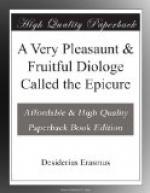as often as thei bee punyshed for Christ and iustice
sake, who dar bee so bold as too cal them beggers
& wretches? wha the Lord himself very famyliarly calleth
them blessed, and commaudeth vs to reioyse for their
state and condition. SPV. Neuerthelesse, these
thynges haue a certayne payne and griefe. HEDO.
Thei haue, but on the onesyde, what for fear of hel,
and the other for hoope of euerlastynge ioye, the
payne is sone past and forgotte Now tell me if you
knewe that || you myghte neuer bee sycke, or elles
that you shoulde feele no payne of your body in your
life tyme, if you woulde but ones suffer your vtter
skinne too bee prycked with a pynnes puinct, would
you not gladly and with all your very heart suffer
then so lytle a payne as that is? SPV Verye
gladlye, yea, rather if I knewe perfectlye that my
teeth would neuer ake, I would willynglye suffer too
bee prycked depe with a nedle, and too haue both mine
eares bored through with a bodkin. HEDO. Surely
what payne soeuer happeneth in this lyfe, it is lesse
and shorter, compared with the eternall paines, then
is the soden pricke of a needle, incompariso of the
||E.iii.|| lyfe of man though it bee neuer so long,
for there is no conuenience or proportion of the thyng
that hath ende, and that whych is infinite. SPV.
You speake very truly. HEDO. Now if a man coulde
fully perswade you, that you should neuer feele payne
in al your life, if you did but ones deuide the flame
of ye fyre, with your hande, whyche thyng vndoughtely
Pithagoras forbade, woulde you not gladlye
doo it? SPV. Yea, on that condicion I had liefer
doo it an hundred times, if I knew precisely the promiser
would kepe touch. HE. It is playne God cannot
deceaue. But now that feelyng of paine in the
fyre is longer vnto the whole lyfe of man, then is
the ||lyfe of ma, in respect of the heauenlye ioye,
althoughe it were thrise so long as ye yeares of Nestor,
for that casting of the hand in the fyre thoughe it
bee neuer so shorte, yet it is some parte of hys lyfe,
but the whole lyfe of man is noo portion of tyme in
respect of the eternal lyfe. SPV. I haue nothyng
too saye against you. HEDO. Doo you then thyncke
that anye affliction or tourment can disquiet those
that prepare them selues wyth a chearful hearte and
a stedfast hoope vnto the kyngedome of God, wher as
the course of this lyfe is nowe so shorte? SPVDE.
I thinke not, if thei haue a sure perswasion and a
constant hope too attayne it. HEDO. I coome
||E.iiii.|| now vnto those pleasures, whiche you obiected
agaynst me, they do wythdrawe them selues from daunsynge,
bankettynge, from pleasaunte seeghtes, they dispyce
all these thynges, as thus: for to haue the vse
of thinges farre more ioyfulle, and haue as great
pleasure as these bee, but after another sorte:
the eye hath not seene, the eare hath not heard, nor
the heart of man cannot thyncke what consolations GOD
hathe ordeined for them that loue hym. Sayncte




